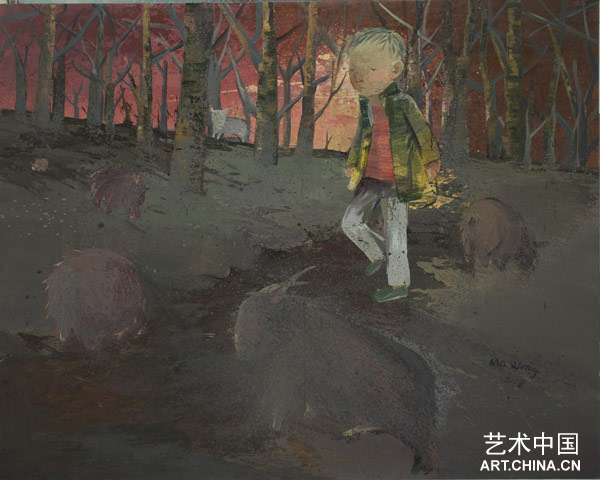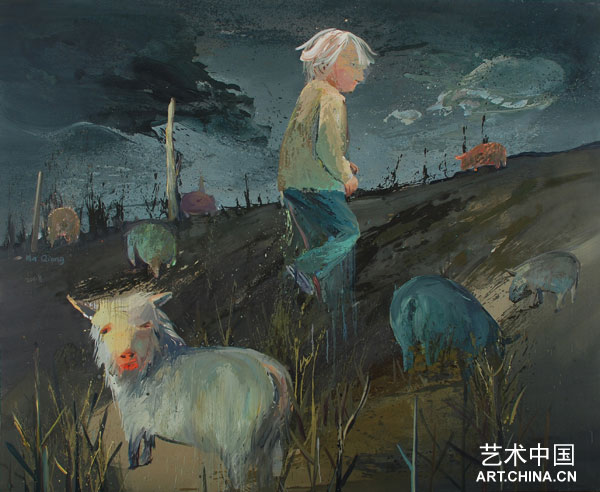
馬瓊,2008放逐(2)Exile(2),200x160cm布面油畫
展覽主題:吞食光芒——馬瓊、孟陽陽雙人展
策展人:李蘇橋
展覽開幕:2009年6月27日 下午4點
展覽日期:2009年6月27日---7月24日
展覽地址:北京空間畫廊(北京市朝陽區(qū)草場地紅1號院C4座)
電話:+8610 51273246 傳真:+8610 51273246
E-Mail: gallerybeijing@gmail.com
Exhibition Theme:Devouring Radiance
-------Ma Qiong & Meng Yangyang Double Solo Exhibition
Curator: Suqiao Li
Opening Reception: June 27th, 4pm
Exhibition Dates:June 27th,2009---July 24rth,2009
Add:Gallery Beijing Space
(No.C4,Red Yard,CaoChangdi,Chaoyang District,Beijing,China)
Tel: +8610 51273246 Fax:+8610 51273246
E-Mail: gallerybeijing@gmail.com
前言:
吞食光芒
馬瓊和孟陽陽都是80後的新生代,兩個有著強烈自我經(jīng)驗和直覺的女性藝術(shù)家,她們描繪著兒童般天真爛漫的世界,充滿了自由的氣息。作品以個人情境和心境作為創(chuàng)作出發(fā)點,試圖向觀眾展示女性藝術(shù)家內(nèi)心敏感的一面以及外在的豪放。
她們的作品呈現(xiàn)出一個時代的人的心理狀態(tài),敏感、頑強、以自我為中心,作品中找不到中國藝術(shù)的主流語境對他們的影響,擺脫了當代藝術(shù)的符號象徵。拋棄中國當代的創(chuàng)作依據(jù),在潛意識裏無視長久形成的市場和學(xué)術(shù)價值觀,這是當代的社會環(huán)境和這一代人的自身勇氣決定的。她們的創(chuàng)作自由地穿梭于個人的意識形象中,體現(xiàn)了個體精神感知與當代社會全球化的相抗衡,對新價值的追索和確證充滿熱情。她們試圖整合童年的各種畫面,並對它們進行碎片式的理解,建立另一種想像之中的新的“情感敘事”,從而呈現(xiàn)出某種獨特的藝術(shù)氣質(zhì)。
把不同的兩個藝術(shù)家放在一起時,能看出80後的人們對生活、歷史、記憶、夢境以及未來的想像,體現(xiàn)個人意識的存在狀態(tài),這個藝術(shù)發(fā)展中的個例恰恰為學(xué)術(shù)研究提供了有力的線索。也許他們並沒有對歷史進行全面的重新審視,但她們有著與生俱來的叛逆與複雜的生存環(huán)境,企圖建立自身發(fā)展的文脈,擺脫了狹隘的社會形態(tài)紛爭,折射出了後社會主義時代人類心理的轉(zhuǎn)變,以個人理念和目標為核心的意識形態(tài)的轉(zhuǎn)變,在這種轉(zhuǎn)變中,屬於這一代人自身的價值觀念被悄然塑造。
Ma Qiong and Meng Yangyang are the new generation of the post-80s. These two female artists have strong instincts and self-experience. They portray a world of innocent children, full of an atmosphere of freedom. Their work is based on personal situations and they use their state of mind as a creative starting point. They try to show the audience the sensitivity of women artists, as well as their external heroism.
Their works show the psychological state of a generation; sensitive, tenacious and self-centered. Mainstream contemporary art have not had an impact on their works. You will not see the typical Chinese images, such as Tiananmen Square, Mao Zedong, as well as a number of other negative images. They have abandoned the base of Chinese contemporary art and ignored the formation of market and academic values which has formed over a long time in the subconscious of previous artists. The works are created from their social environment and their own courage. Their creativity captures the spirit of individual perception. They express their response through their own spirit of individual perception to the globalization of contemporary society; full of passion to present new values. They have tried to integrate a variety of images of childhood and comprehend these fragments. They seek to establish a new impression of the "emotional narrative", showing a unique artistic style.
These two different artists’ works capture the spirit of life in the post-80s. This is presented in the way they think about history, memories, dreams and their imagination of the future. They have reflected the existence of a state of personal awareness. This example precisely provides the evidence for academic research in the developing art world. Maybe they did not re-examine the comprehensive history because they come from a birthright of rebellion and complex environment. But they attempt to create a context for self-development, out of narrow social forms of dispute. It reflects the changing of psychology of the post-socialist era. The core of the change is philosophy and objectives of their personal ideology. Such a change belongs to this generation's own values which are quietly developing.
